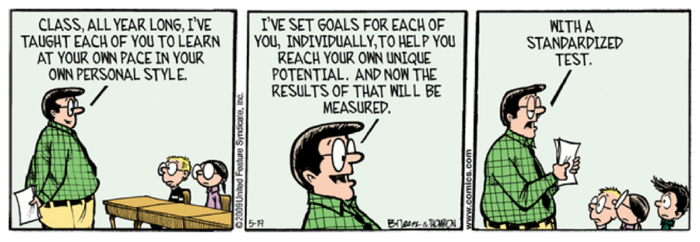
T-E-S-T is a four letter word. I don’t like tests. Students don’t like tests. But standardized testing has become common in the field of education. The number of standardized tests administered to students has exploded in the past decade. Mandated standardized tests like the SAT, ACT, ISAT, CogAT, PLAN and ITBS can promote an academic alphabet soup of fear and judgment. Cut scores and national norms categorize students, labeling them according to a score on a multiple choice exam. What value do these tests have? In a video posted to Facebook by the White House, President Obama pledged to take steps to reduce testing overload.
In “moderation, smart, strategic tests can help us measure our kids’ progress in school, and it can help them learn,” Obama said. “But I also hear from parents who, rightly, worry about too much testing, and from teachers who feel so much pressure to teach to a test that it takes the joy out of teaching and learning, both for them and for the students. I want to fix that.”
Certainly tests can be used to measure a student’s performance and abilities in specific areas. It is an efficient way to collect data, offer placement and even inform our instruction. Administering and scoring standardized tests online can provide baseline measurements and tracking students at a variety of points throughout their educational journey, but not without controversy or debate. Even with multiple measures, tests appear to place students into a box. Is there an opportunity to think outside the box?
In English, we recently adopted ACCUPLACER as a placement test for entry into our sequence of composition and reading courses. We are piloting ACCUPLACER as a replacement for COMPASS, eWrite and ASSET, standardized tests we have used in the past for placing students. Faculty have also developed “home grown” tests like summary tests and essay tests, but not without extra costs and a labor intensive commitment. We continue to explore best practices in evaluating students.
College of DuPage offers a variety of comprehensive testing services:
The Testing Centers at College of DuPage are dedicated to enhancing student success by providing comprehensive, accessible testing services. All centers adhere to the NCTA Professional Standards & Guidelines, safeguard test integrity and confidentiality, and create an optimal testing environment that will meet the needs of our students, faculty, administrators and community. Our services support course, college and program requirements; identify academic strengths and weaknesses; clarify interests, values and personality traits; and complete specialized testing needs.
National College Testing Association (NCTA)
The Testing Center at College of DuPage is certified by the National College Testing Association (NCTA) and is committed to maintaining the NCTA Professional Standards & Guidelines. Since 2010, these Standards and Guidelines have been used in the NCTA Test Center Certification program to ensure that certified centers are following best practices.
This includes delivery of national standardized tests, placement exams, classroom makeup tests, non-standard exam administrations for students with disabilities, certification exams, distance exams, etc.